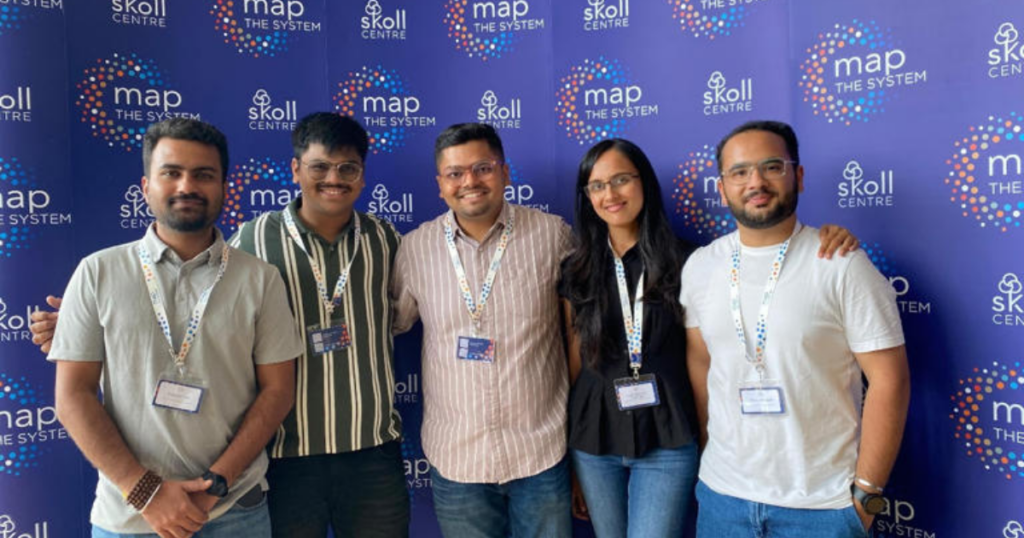GIM becomes the first Indian B-school to reach Oxford’s ‘Map the System’ global finals with a justice research project by PGDM students.

A student team mapped justice challenges in India with global impact.
In a groundbreaking achievement for Indian management education, the Goa Institute of Management (GIM) has become the first Indian business school to qualify for the global finals of ‘Map the System’, an internationally renowned competition hosted by the Skoll Centre for Social Entrepreneurship at the University of Oxford.
The final round of the event was held from July 3 to 6, 2025, at Oxford’s Saïd Business School, bringing together students and change-makers from around the world. This milestone reflects a growing global recognition of Indian institutions in the space of systems thinking, social innovation, and problem-based learning.
A Team with a Purpose
Representing GIM at the global stage was a five-member team of second-year PGDM students: Aryan Rajpal, Shubham Das, Dhruv Bhagat, Aditi Naringe, and Yash Kabra. Their project, titled “Mapping Access to Justice in India,” explored the structural and systemic issues that prevent equitable justice delivery in the country.
Rather than focusing on surface-level challenges like delays in court proceedings or case backlogs, the students conducted a deep-dive analysis into the roots of the problem. They investigated how poor infrastructure, outdated legal frameworks, hierarchical thinking, and lack of accountability impact access to justice for millions—particularly in rural and underprivileged communities.
The team utilized advanced tools such as the Iceberg Model and causal loop diagrams to map the underlying factors and interdependencies within the justice ecosystem. Their work provided a holistic and insightful look at the problem and proposed Online Dispute Resolution (ODR) as a practical, technology-enabled solution for improving access, especially in remote areas.
A Competition That Values Understanding Over Quick Fixes
‘Map the System’ is unlike conventional business competitions. Organized by the Skoll Centre at Oxford, the challenge encourages students to deeply understand social and environmental issues through research and systems mapping, rather than pushing them to present instant solutions. It’s about developing empathy and gaining clarity around complex real-world problems—recognizing that true change begins with understanding.
Participants are expected to present their findings in written, visual, and oral formats, testing not just their analytical skills, but also their ability to communicate insights creatively and effectively. GIM’s students successfully cleared institutional and national rounds before being selected for the global stage.
Out of more than 1,750 participants from around the world, only 134 students from 50 institutions across 17 countries were chosen for the finals. GIM’s entry stands out not only for its depth and relevance but also for being the first-ever representation from an Indian business school.
Mentorship and Global Exposure
The GIM team was mentored by Professor Pravat Surya Kar, Professor Andy Silveria, and Professor Karman Khanna, who helped the students apply systems thinking tools effectively and shaped their project to meet the global standard.
At the Oxford finals, the students presented their work before a panel of experts in academia, public policy, and the social impact sector. The event included interactive workshops, keynote sessions, and networking opportunities with student teams and thought leaders from across the world, giving the GIM students a truly global learning experience.
Institutional Pride and Future Vision
GIM’s Director, Prof. Ajit Parulekar, expressed immense pride in the team’s achievement. “This milestone highlights GIM’s commitment to experiential learning and socially relevant education. Our emphasis on systems thinking and problem-solving is bearing fruit, and this is a proud moment for both faculty and students,” he said.
The students, too, viewed the experience as transformative. They described the competition as a turning point in their academic lives, helping them develop the ability to look beyond symptoms and identify the systems behind everyday social challenges.
India’s Emerging Voice in Social Innovation
With this global recognition, the Goa Institute of Management has joined a new wave of Indian institutions making their presence felt in international forums on social impact. It reflects a significant shift in how management education is evolving—prioritizing not only business acumen but also empathy, ethical leadership, and systems-based problem solving.
As GIM opens new doors for Indian B-schools on the global stage, its success sends a strong message: management education in India is ready to lead conversations that matter—locally and globally.
Three Senior Citizens Clear NEET, Apply for MBBS in Tamil Nadu